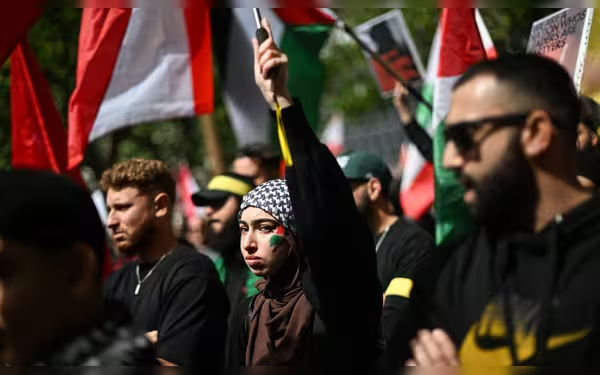Sunday, October 6, 2024 12:33 AM
Australia Police Move to Ban Pro-Palestine Protests in Sydney
- Australian police seek court order to ban protests.
- Protests mark one year since Gaza conflict began.
- Activists claim ban infringes on democratic rights.
 Image Credits: arabnewspk
Image Credits: arabnewspkAustralian police aim to ban pro-Palestine protests in Sydney, citing safety concerns amid escalating tensions in the Middle East.
In recent times, the ongoing conflict between Israel and Palestine has sparked significant global attention, with various protests emerging in support of Palestine. One such protest is scheduled to take place in Sydney, Australia, on October 6 and 7, marking one year since the onset of the war in Gaza, which was ignited by a deadly attack from Hamas militants. This conflict has resulted in the loss of tens of thousands of lives and has led to a severe humanitarian crisis in the Middle East.
In response to the planned rally, Australian police have expressed their intention to seek a court order to ban the event. They have engaged in discussions with the rally organizers but have concluded that they are not confident the protest can be conducted safely. The New South Wales state police emphasized that their primary concern is the safety of both the participants and the broader community. In a statement, they remarked, "The first priority ... is the safety of the participants and the wider community." This highlights the delicate balance authorities must maintain between allowing free expression and ensuring public safety.
The situation has become increasingly tense, particularly after Iran launched a series of ballistic missiles at Israel in retaliation for Israel's military actions against Hezbollah, a militant group based in Lebanon and supported by Tehran. Israel has responded with threats of a "painful response," further escalating the already volatile situation.
In light of the police's actions, the Palestine Action Group Sydney took to Facebook to voice their opposition, stating that the police's move to ban the protests is an infringement on fundamental democratic rights. They asserted, "We have a right to demonstrate ... the Palestine Action Group unequivocally opposes this attempt to silence protests." This sentiment reflects a broader concern among activists regarding the limitations placed on public demonstrations, especially in the context of significant political issues.
Recent protests in Melbourne have also drawn attention, with some participants displaying flags associated with Hezbollah and images of its leader, Sayyed Hassan Nasrallah, who was reportedly killed in Israeli strikes last week. This has prompted authorities to initiate an investigation, as Hezbollah is classified as a "listed terrorist organization" in Australia. It is illegal for Australians to provide financial support to such groups or to engage in combat alongside them.
Since the outbreak of the Israel-Gaza war, Australia has witnessed a troubling increase in hate incidents. In response, the government enacted laws last year prohibiting public displays of symbols associated with terrorist organizations. This legal framework aims to curb the potential for violence and maintain public order.
Moreover, an anti-war protest in Melbourne last month turned violent, resulting in injuries to two dozen police officers. Authorities were compelled to use sponge grenades, flash-bang devices, and irritant sprays to manage a crowd that had become hostile. Such incidents underscore the challenges faced by law enforcement in managing protests, particularly those tied to sensitive geopolitical issues.
As the situation unfolds, it is crucial for both authorities and citizens to engage in constructive dialogue. While the right to protest is a cornerstone of democratic society, it must be balanced with the need for public safety. The upcoming rally in Sydney will undoubtedly be a focal point for discussions surrounding freedom of expression, the ongoing conflict in the Middle East, and the responsibilities of both protesters and law enforcement. It remains to be seen how this complex situation will evolve, but it is clear that the stakes are high for all involved.













